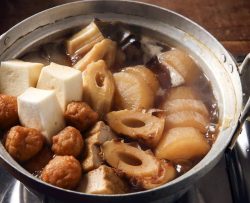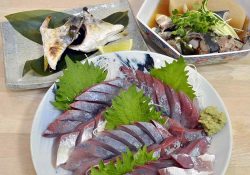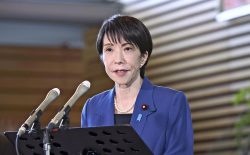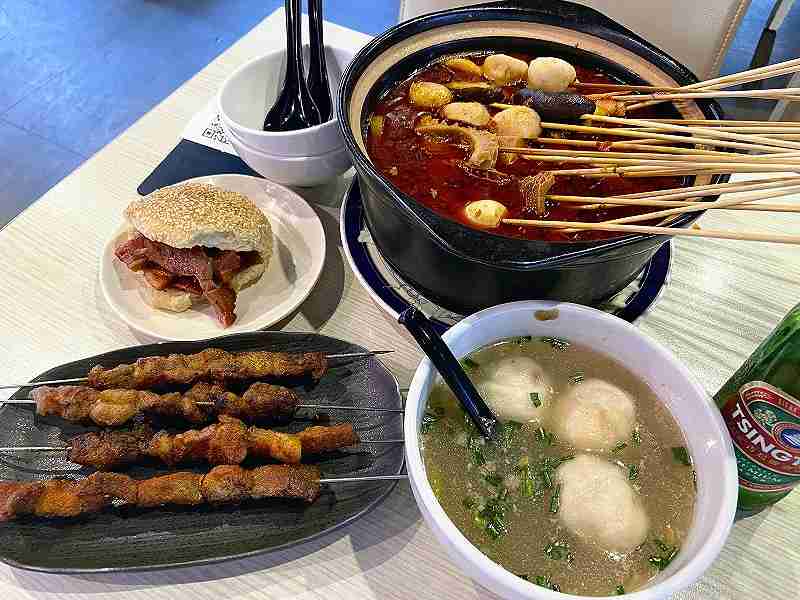
Chinese dishes from various parts of China offered at Futto Xiaochi Cheng food court
12:21 JST, October 4, 2022
Restaurants that offer authentic dishes from China and other countries are becoming increasingly popular in and around Tokyo, providing opportunities to enjoy the atmosphere of overseas travel even as the coronavirus pandemic continues.
One floor of a building in the Ikebukuro area of Tokyo is filled with signboards in Chinese characters that say things like Shanghai snacks, Fujian burger, Northeast barbecue. Futto Xiaochi Cheng, which opened last September, has food stands that offer signature dishes from various parts of China in a typical Chinese-style food court.
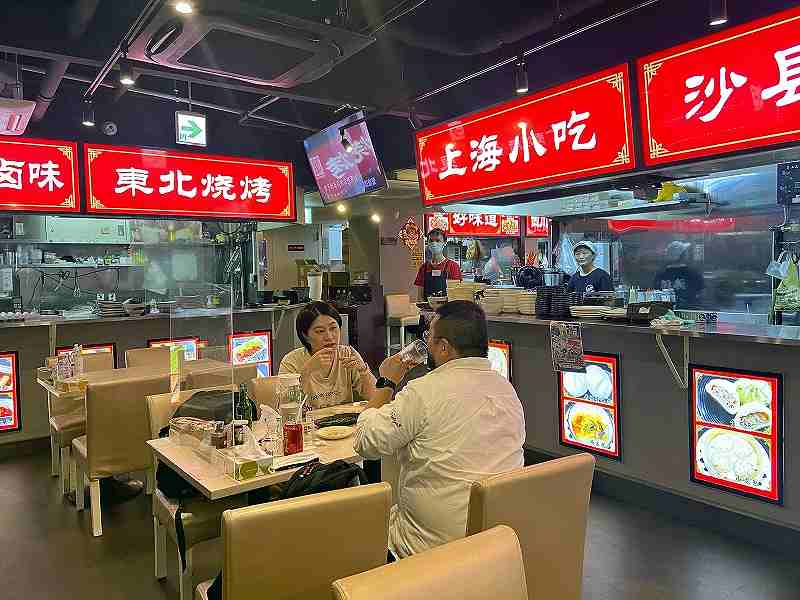
People enjoy authentic Chinese food at Futto Xiaochi Cheng food court in the Ikebukuro area of Tokyo.
A man from Tokorozawa, Saitama Prefecture, was having spicy Sichuan food stir-fried with plenty of chili pepper and huajiao Sichuan pepper. “It was a surprise for my tastebuds, but it’s addictive,” the 48-year-old said. His wife, 35, said happily: “Because of the pandemic, I can’t enjoy traveling to other Asian countries as I used to. But here, we can get the feel of the local atmosphere.”
In recent years, there has been a boom in Chinese restaurants that serve authentic Chinese food, unchanged from what you would find in China. These restaurants are called “gachi chuka,” with “gachi” meaning “serious” or “for real” in the casual Japanese used by young people, and chuka meaning Chinese.
In addition to Sichuan cuisine, famous for its tongue-numbing spiciness, regional specialties include lamb skewers rich in spice from northeast China, and Fujian cuisine such as fish balls in a simple but tasty broth.
Masato Nakamura, who heads a study group called Tokyo Deep China, said, “These are dishes made by Chinese people for Chinese people.” According to Nakamura, one of the reasons such restaurants have been emerging is that the number of Chinese people in Japan for business or study has increased, making it possible to run a business without catering solely to the needs of Japanese customers. As the pandemic made it difficult for them to return to China, the number of such restaurants seems to have increased further.
In Tokyo, many of the restaurants are located in Ikebukuro and Takadanobaba, where many Chinese students gather. They are also starting to emerge in cities outside Tokyo, such as Kawaguchi in Saitama Prefecture and the Dotonbori area of Osaka.
Another world
Authentic Chinese restaurants are becoming popular among Japanese people as well, with comments like “It feels like you are in China” popping up on social media.
A third-year high school student from Niigata City visited Futto Xiaochi Cheng in Ikebukuro and said she learned about the food court on a video sharing website. “I feel like I’m in a movie instead of Japan,” she said.
“About 80% of customers on weekends are Japanese,” said a Chinese manager of the food court. “We’ve now added Japanese language to our menus.”
Jiunian Shiban, a restaurant that opened in Ueno in January, is modeled after a Chinese cafeteria from the 1990s. Its walls are decorated with posters of Chinese films from that period. While many of the customers are Chinese who feel nostalgic about the old days, a staff member said that recently more Japanese customers are visiting the restaurant, perhaps out of curiosity.
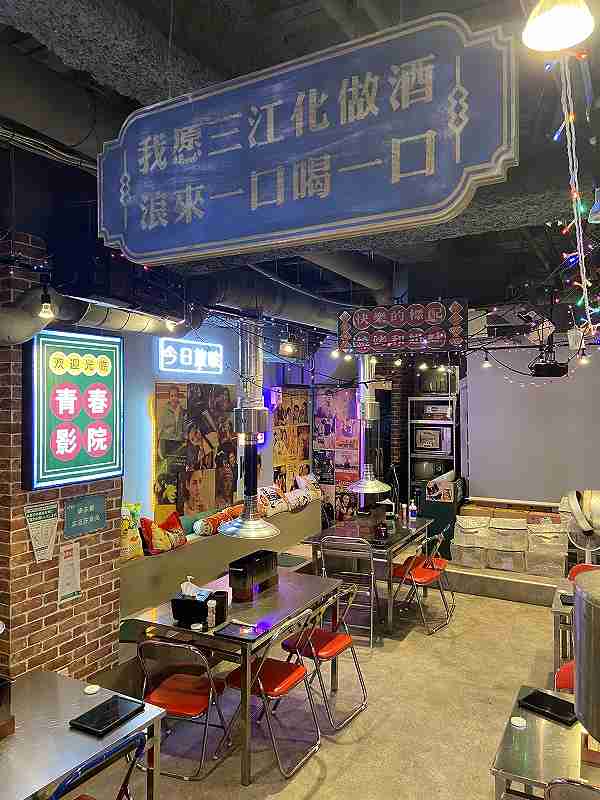
Chinese restaurant Jiunien Shiban in Ueno, Tokyo
“There is an element of entertainment, allowing customers to step out of their usual life through Chinese food, which Japanese people are familiar with, ”said Kunihiro Takeda, a researcher at Hot Pepper Gourmet’s food service research center. “This resonates with consumers who want to enjoy the experience of eating out as the pandemic has made it rare.”
Spice street
Authentic restaurants are not limited to Chinese food. The Shin-Okubo area in Tokyo is known as Korea Town for its concentration of Korean restaurants. Near Korea Town is a section called Islamic Street.
The Pakistani shop Siddique National Mart, which opened in August 2021, offers a wide variety of halal certified ingredients, spices, and sweets such as doughnuts soaked in syrup. It also offers takeaway dishes like rice with curried beans.
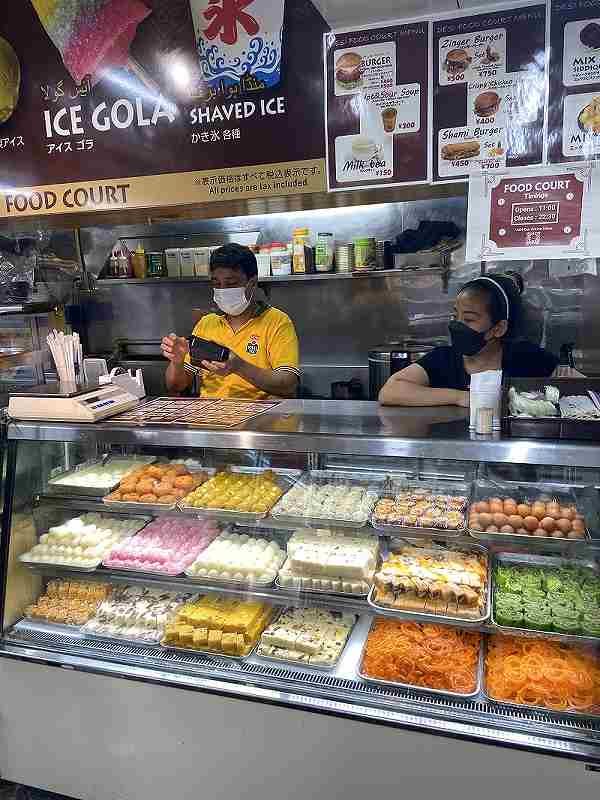
Siddique National Mart in the Shin-Okubo area of Tokyo
Top Articles in Features
-

Sapporo Snow Festival Opens with 210 Snow and Ice Sculptures at 3 Venues in Hokkaido, Features Huge Dogu
-

Tokyo’s New Record-Breaking Fountain Named ‘Tokyo Aqua Symphony’
-

Tourists Flock to Ice Dome Lodge at Resort in Hokkaido, Japan; Facility Invites Visitors to Sleep on Beds Made of Ice
-

High-Hydration Bread on the Rise, Seeing Increase in Specialty Shops, Recipe Searches
-

Maltese Pavilion’s Famous Ftira Bread Now Available in Osaka; Loaves Became Popular during 2025 Osaka-Kansai Expo
JN ACCESS RANKING
-

Japan Institute to Use Domestic Commercial Optical Lattice Clock to Set Japan Standard Time
-

Israeli Ambassador to Japan Speaks about Japan’s Role in the Reconstruction of Gaza
-

Man Infected with Measles May Have Come in Contact with Many People in Tokyo, Went to Store, Restaurant Around When Symptoms Emerged
-

Prudential Life Insurance Plans to Fully Compensate for Damages Caused by Fraudulent Actions Without Waiting for Third-Party Committee Review
-

Woman with Measles Visited Hospital in Tokyo Multiple Times Before Being Diagnosed with Disease


